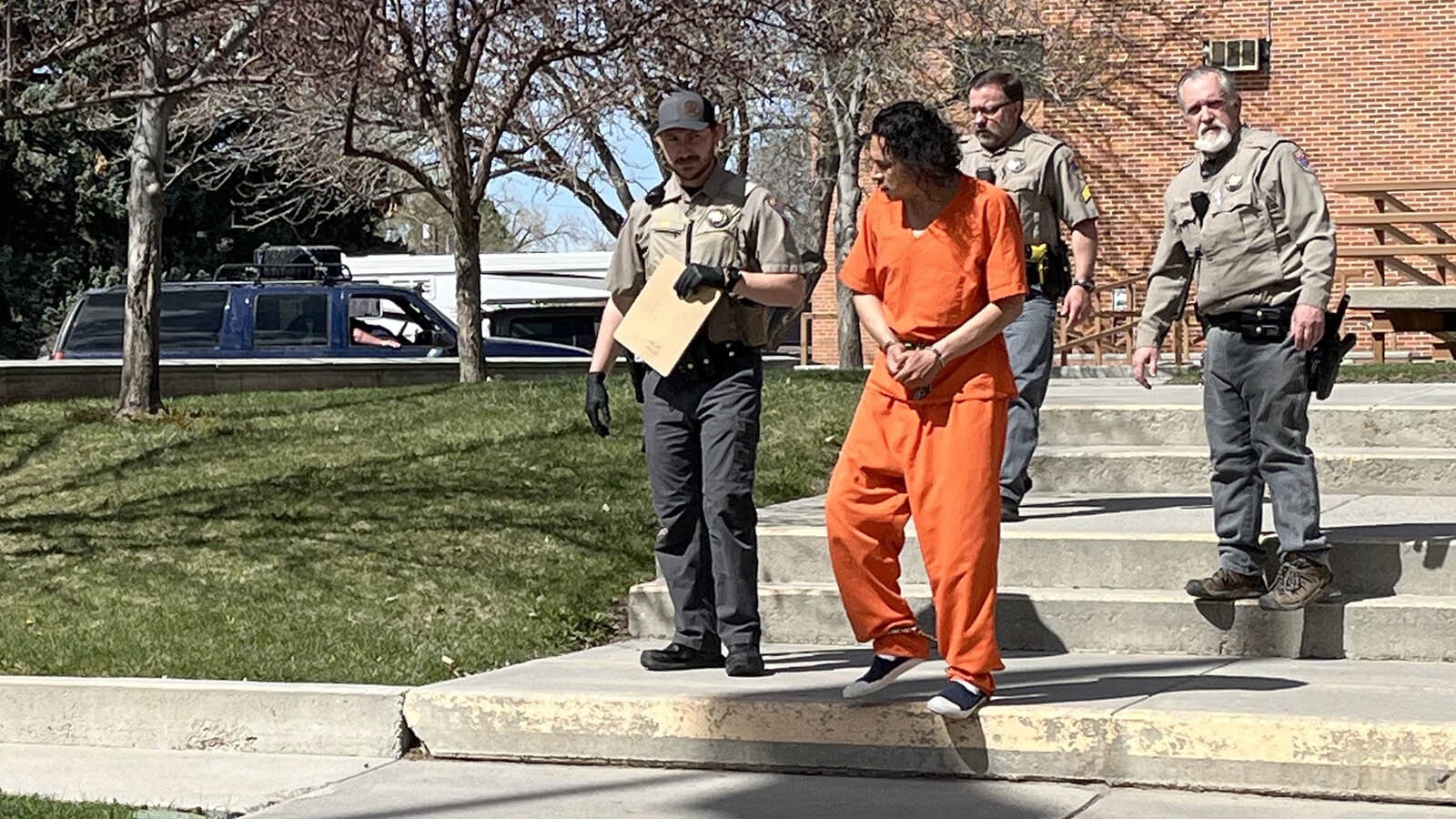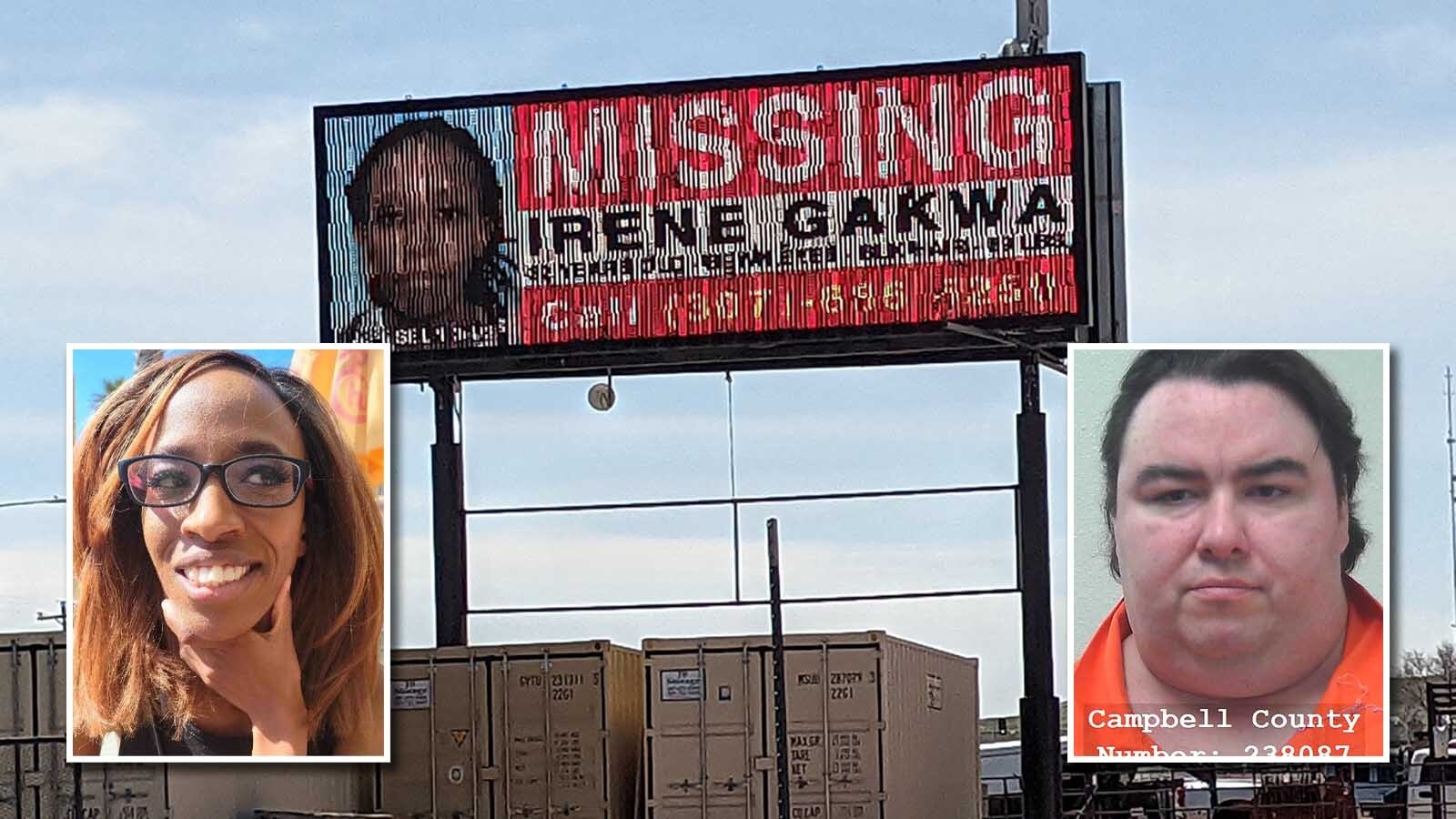A Lander, Wyoming, man is asking his trial jury to find that when he killed an unexpected but initially welcome visitor to his home, he was wracked with terrifying delusions.
The second-degree murder trial for Michael Vigil, 39, started Monday in Fremont County District Court, with jury selection lasting most of the day.
Vigil’s defense attorney, Ryan Semerad of The Fuller and Semerad Law Firm, and Fremont County Assistant Attorney Ember Oakley squared off in the mid-afternoon with their opening statements.
Vigil is accused of bludgeoning Warren Jorgensen, 57, to death with a 3-foot piece of rebar overnight April 13-14 in Vigil’s home. Jorgensen had come over earlier after Vigil met him at a liquor store in town and bought him some alcohol, according to court statements.
At some point the evening of April 13, things grew intense for Vigil.
He knocked at his neighbor’s door several times, but no answer came. Then he went back to his home, where Jorgenson had ended up in Vigil’s bed, and the violent incident followed, the attorneys said.
Vigil told Lander Police Department investigators that Jorgenson had taken off his pants and tried attacking him sexually, so he attacked back, court documents say.
Vigil killed Jorgenson, Semerad conceded in his opening statement to the jury.
But Vigil did so under intense delusions after enduring childhood sexual abuse, nearly two decades of persistent schizophrenia, numerous hospitalizations and a recent fallout with his medication patterns, the defense attorney said.
He added that Vigil had also made three recent calls to a Veteran’s Affairs suicide hotline.
‘It Was Like A Movie’
In a chair 10 feet behind Semerad, Vigil sat clean-shaven in a collared, periwinkle-colored shirt and wearing his hair in a low and tidy ponytail watching his defense attorney’s every gesture.
“This veteran, who was going to commit suicide (weeks prior), had been off his meds for days, thinks this person is going to sexually victimize him,” said Semerad. “Michael describes it: ‘It was like a movie. … I just wanted him to leave.”
After attacking Jorgenson, Vigil went to sleep.
In the morning, he called police and told them that he’d beaten the man to death with a pipe, according to court statements.
Vigil emphasized to police that he’d called them before he made his coffee — before starting his routine — because odd points like that are significant to him, while the homicide itself was “different” for him than it is for someone not enduring a mental illness, Semerad said.
The defender launched an explanation of schizophrenia, which he said prompted Vigil’s first psychotic episode in 2006 while the man was still in the U.S. Army. He described the illness as reducing gray matter in crucial portions of the brain, producing hallucinations and delusions, the latter of which are persistent beliefs in falsehoods.
“He (tells investigators) about 18 times that he was afraid,” said Semerad.
The defender also pointed to some of the evidence indicating that Vigil made haphazard attempts to cover up the crime, such as burning half of Jorgenson’s tribal identification card and leaving it on the man’s back, as signposts of his poor mental state.
“What is partially burning an ID and leaving it on a person’s back actually going to do?” asked Semerad. “It doesn’t make any sense.”
‘Angry’
Oakley, conversely, said Vigil was clear and coherent when he told police what he’d done in a series of 911 calls.
She noted that the state’s mental health professional believes Vigil was sane enough to follow the law during the killing, while Vigil’s contracted mental health professional indicates to the contrary. But Oakley said that wasn’t in conclusive enough terms under the legal standard to prove a not-guilty-by-reason-of-mental illness case.
At least one of Jorgenson’s loved ones in the gallery wept during Oakley’s description of blood spatter on Vigil’s walls, blood pools on the bed and outside patio, a bloody handprint on the washing machine and signs that Vigil had tried but failed miserably to clean the blood.
The physical evidence indicates that Vigil dragged Jorgenson to the outside patio, then dragged him into the grass of the back yard, Oakley said.
When an investigator asked Vigil why he’d burned Jorgenson’s tribal identification card, Vigil said, “I didn’t want to get in trouble,” Oakley related from his police interviews.
She attributed personal choice to many of Vigil’s actions, saying he rationalized his fear that Jorgenson was making a sexual advance on him, and he chose to react.
“He tells detectives he was trying to stand his ground,” said Oakley, adding that Vigil had asked a 911 operator the morning of April 14 if Wyoming’s stand-your-ground self-defense laws were still in effect.
She pointed to the disagreement between the two testimonies the state’s and defendant’s respective mental health professionals are expected to give.
“He (told the state’s doctor) he knew hitting someone with a metal pipe was wrong,” said Oakley. “And to her — to Dr. (Katherine) Mahaffey — for the first time, he admits he was angry.”
The prosecutor said Mahaffey is expected to testify that Vigil was in control of his thoughts and behavior.
Oakley also told the jury it will hear evidence of Jorgenson’s severe injuries, including a breach in his skull going all the way to his brain.
Some Legal Stuff
The trial, which has unique aspects to it, will continue with the state’s first witness testifying Tuesday morning.
Generally at trials, criminal defendants don’t have the burden to prove their own innocence, but may defend against the state’s efforts to prove it. At this trial, however, Vigil has not only pleaded “not guilty,” but also “not guilty by reason of mental illness.”
That latter plea gives him a burden to prove by a greater weight of the evidence that his mental state at the time of the crime was so grossly and demonstratively impaired that he couldn’t rationalize the wrongfulness of his conduct or conform it to the law.
Clair McFarland can be reached at clair@cowboystatedaily.com.





